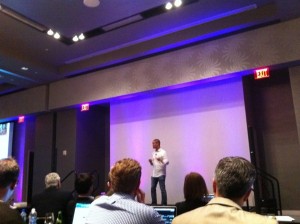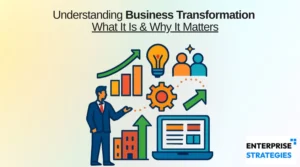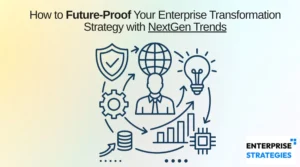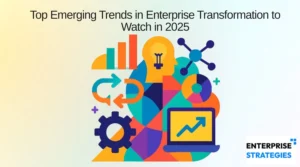 Social Business is not new, but it has recently been moved to the top of many agendas. Why, and more importantly, why now?
Social Business is not new, but it has recently been moved to the top of many agendas. Why, and more importantly, why now?
During his address to the 2011 Social Business Summit audience in Austin, Texas, JP Rangaswami, Salesforce Chief Scientist, eloquently explained that the reason that social business is now at the top of everyone’s agenda is because along with all of our great engineering accomplishments over the past several years, “somewhere along the way, we engineered the social out of doing business.” As an industry that has been broadly focused on standardizing and streamlining the way we do business, through Web 2.0 and Enterprise 2.0 implementations, we have inadvertently replaced a “relationship first” focus with a focus on business transactions.
This was not your typical technology or business conference. Taking place in the newly opened, and dimly lit, W Austin and with breaks that included revitalizing gourmet teas and chocolate milk, one could have easy mistaken the event for a South by Southwest indie film premiere or soon-to-be-discovered headlining music act. The speaker line up included the Who’s who in social business. Below are some highlights from the day’s discussions.
Rawn Shah, author of 7 books and Social Business Transformation Consultant at IBM delivered a dizzying amount of social business statistics and contextual materials for defining and addressing social business challenges. The combination of jarring statistics (e.g., Companies waste 5.3 hours per week, per employee because of inefficient process) and practical, experience-based advice on how to address these challenges left even the most information hungry satiated.
I also very much enjoyed the diversity of speakers. While likely unintentional, the juxtaposition of Philip Kaplan, Blippy, Co-Founder and John Hagel, Deloitte, Director & Author of The Power of Pull made for great, and in my opinion, humorous comparison of new and cool vs. tried and true. Philip’s references to “old people” as the bane of his self- described forward-thinking and over-sharing way of doing business elicited tentative chuckles from an age-diverse audience. Hagel’s words of wisdom, based on 30 years of management consulting, had the masses furiously keying in notes. In a 30 minute dissertation beginning with the premise, “We are moving from a world of diminishing returns to a world of increasing returns”, John espoused the following words of wisdom:
Keys to Social Business Success
- Going slow at the outset of your social business journey is a surer path to success than a “must do everything now” approach.
- Small moves, smartly made, set big changes in motion.
- What is missing in most social business attempts is a systematic link to metrics that matter.
- Trying to determine an ROI for your social business project is a fool’s game.
- Start your social business transformation at the fringe, not at the core, of your business.
Each point was verbally illustrated with real world examples of work done at companies such as SAP. I say verbally, because John did not use slides. He announced this departure from requisite PowerPoint protocol at the beginning of his talk. The audience cheered.
Kicking off with a banking-related “bad customer service” story we could all relate to was Josh Bernoff, Forrester, Senior Vice President, Idea Development & Co-Author of Groundswell. He emphasized that only empowered employees can serve empowered customers.
Josh cited a best of class customer service story about Best Buy and their fabled Twelpforce. Using a framework termed H.E.R.O. (Highly Empowered and Resourceful Operatives), he illustrated his points with this and several other real world examples.
Next Michael Gold, Jazz Impact, Founder and President, literally had us dancing in the aisles by musically demonstrating the parallels of Jazz and social business. Michael is a master of correlation. His research and practice into the study of jazz and how it relates to implementing a social business culture resonated well with everyone. Starting broadly with the proclamation that, “everything in life has a rhythm”, from the beat of a heart to a transaction on Wall Street, he and an ensemble he pieced together only a few days before, demonstrated his points about business, life and the key success in both; improvisation. He took us deeper in music and thought covering more ethereal topics as liminal zones and sympathetic listening and prepared us for our journey to happiness on The Delivering Happiness Bus.
Jenn Lim, Delivering Happiness, CEO & Chief Happiness Officer and Tony Hsieh, Zappos, CEO & Author of #1 NYT Bestseller, Delivering Happiness capped the day off with discussions of their past, their companies, their thoughts on what brings happiness and how they have implemented these core values into every aspect of their company.
How can you perfect social business and happiness?
According to Tony, who has been researching both the science and practice of happiness for some time, there are 4 contributing factors to a person’s happiness.
Keys to Happiness
- Perceived control
- Perceived progress
- Connectedness
- Meaning
In his presentation, Tony described how each of these factors contributes in part to our overall feeling of happiness. He spent the most time, however, on the fourth factor; meaning. Simply put, having a calling, not a career, is instrumental in finding your happiness. Not typical conference fare, I pondered this revelation for the rest of his talk. What was my career calling? I finally settled on the belief that it is the opportunity to make people’s corporate work lives better by helping companies identify and implement collaborative cultures and processes. What is your calling?
Social Business Summit Austin provided me exactly the education, inspiration and networking for which I was looking. Many thanks to Jim Worth for providing a compendium of the event. Check it out. Better still, you can catch the event later this month in London or next month in Singapore.
Either way, I hope you find happiness.




